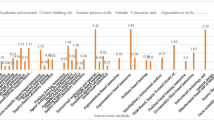Conclusion
This study points to the fact that it would be practical to compare and assess the instructional strategies of exemplary and novice elementary science teachers using a set of criteria derived from published teacher effectiveness studies. According to this study there are differences ranging from significant to null between the instructional behaviors of exemplary and novice teachers, and it indicates that it may not be appropriate to rely entirely upon the findings of individual teacher effectiveness studies to prepare effective preservice teachers. Science teacher educators need to focus more directly on the differences in instructional strategies between the exemplary and novice teachers and inquire further into determining the causes for the differences. Hurd (1982) reported that about half of the elementary teachers studied believe that their preservice education failed to prepare them to teach science in real classrooms. If what separates exemplary teachers from novices can be clearly identified, then the science teacher educator’s task of preparing effective preservice teachers will be an easier one. Then it would be also possible to develop effective preservice science teacher education programs more congruent with exemplary science teaching practices and augment the existing science teacher education knowledge base through further research.
Similar content being viewed by others
References
Anthony, W. S. (1973). Learning to discover rules by discovery.Journal of Educational Psychology, 64(3), 325–328.
Berliner, D. C. (1986). In search of the expert pedagogue.Educational Researcher, 15(7), 5–13.
Berliner, D. C. (1990). The place of process-product research in developing the agenda for research on teacher thinking.Educational Psychologist, 24(4), 325–344.
Bryant, N., & Anderson, H. A. (1972). Effects of performance objectives on achievement.Journal of Research in Science Teaching, 9, 369–375.
Galluzzo, G. R. (1984).A study of student teacher thinking. A paper presented at the annual meeting of the American Educational Research Association, New Orleans.
Geller, E. S. (1992). Is it realistic to expect quality teaching?Journal of Applied Behavior Analysis, 25(1), 3–7.
Hart, F. W. (1936).Teachers and teaching: By the ten thousand high school seniors. London: Macmillan.
Helgeson, S. L., Blosser, P. E., & Howe, R. W. (1977).The status of pre-college science, mathematics, and social science education: 1955–1975. Vol. I: Science education. Columbus, OH: ERIC Clearinghouse for Science, Mathematics, and Environmental Education.
Hofwolt, C. A. (1990). Elementary science teaching competencies. In Barron, L. C., Goldman, E. S., Joesten, M. D., Hofwolt, C. A., Holladay, W. G., & Sherwood, R. D.,Improving science education: A collaborative approach to the preparation of elementary school teachers—Year-end activity report, May 22, 1990 (Year-end report submitted to the National Science Foundation, Grant No. TPE-8950310). Nashville, TN: Vanderbilt University.
House, E., Lapan, S., & Mathison, S. (1989). Teacher inference.Cambridge Journal of Education, 19(1), 53–58.
Housner, L. D., & Griffey, D. C. (1985). Teacher cognition differences in planning and interactive decision making between experienced and inexperienced teachers.Research Quarterly for Excellence in Sport, 56, 45–53.
Hurd, P. D. (1982).State of precollege education in mathematics and science. A paper presented at the National Convention on Precollege Education in Mathematics and Science. Washington, DC: National Academy of Science and National Academy of Education.
Johnson, C. C., & Sherman, J. E. (1975). Effects of behavioral objectives on student achievement in ISCS.Science Education, 59, 177–180.
Kumar, D. D. (1991).A comparative analysis of the instructional strategies of exemplary and novice elementary science teachers. Unpublished doctoral dissertation, Vanderbilt University, Nashville, TN.
Montage, E. J., & Ward, R. M. (1968). The development of problem solving abilities in secondary school chemistry.Journal of Research in Science Teaching, 59, 13–18.
Reed, S. K. (1982).Cognition: Theory and applications. Belmont, CA: Brooks/Cole.
Rice, D. R., Von Eschenbach, G., & Noland, R. G. (1988). Teacher effectiveness: Perspectives by teachers, principals, and career incentive plan coordinators.Education, 109(1), 91–99.
Rowe, M. B. (1974). Wait-time and rewards as instructional variables, their influence on language, logic, and fate control: Part one—Wait-time.Journal of Research in Science Teaching, 11, 81–94.
Stake, R. E., & Easley, J. A., Jr. (1978).Case studies in science education, Vol. 2: Design, overview, and general findings. Washington, DC: U. S. Government Printing Office.
Talton, E. L., & Simpson, R. D. (1987). Relationships of attitude toward classroom environment with attitude toward and achievement in science among tenth grade biology students.Journal of Research in Science Teaching, 24(6), 507–525.
Tobin, K. G., & Capie, W. (1982). Relationships between classroom process variables and middle-school science achievement.Journal of Educational Psychology, 74(6), 441–454.
Tobin, K. G., & Fraser, B. J. (1990). What does it mean to be an exemplary science teacher?Journal of Research in Science Teaching, 27(1), 3–25.
Wise, K. C., & Okey, J. R. (1983). A meta-analysis of the effect of various science teaching strategies on achievement.Journal of Research in Science Teaching, 20(5), 419–435.
Yager, R. E., Hidayat, E. H., & Penick, J. E. (1988). Features which separate least effective from most effective science teachers.Journal of Research in Science Teaching, 25(3), 165–177.
Author information
Authors and Affiliations
About this article
Cite this article
Kumar, D.D., Hofwolt, C.A. Implications of a comparative assessment of exemplary and novice elementary teachers. J Sci Teacher Educ 3, 123–126 (1992). https://doi.org/10.1007/BF02614780
Issue Date:
DOI: https://doi.org/10.1007/BF02614780




